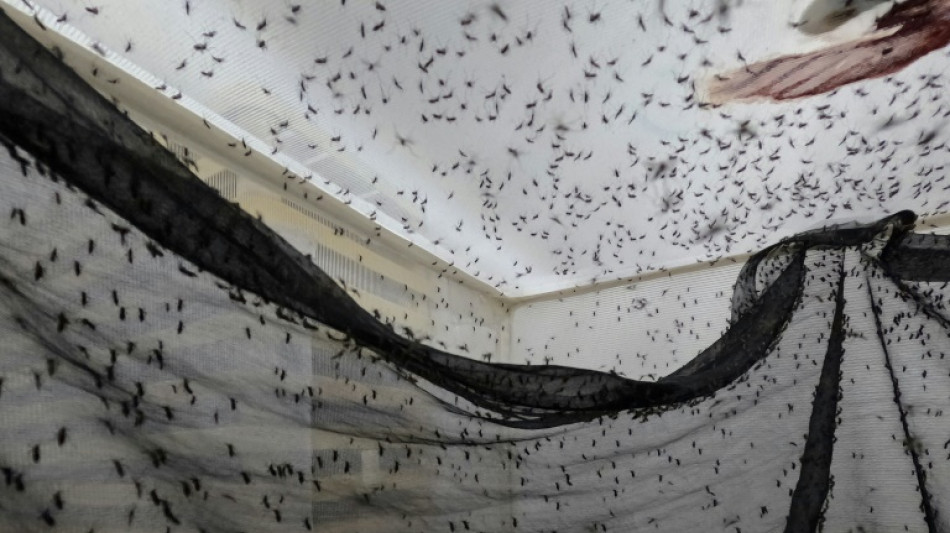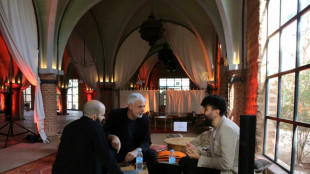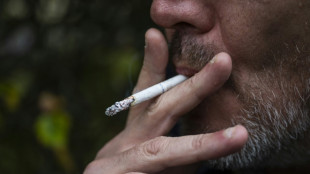
-
 Iran Nobel winner released for three weeks, 'unconditional' freedom urged
Iran Nobel winner released for three weeks, 'unconditional' freedom urged
-
Red Cross marks record numbers of humanitarians killed in 2024

-
 Johnson's Grand Slam 'no threat', says World Athletics boss Coe
Johnson's Grand Slam 'no threat', says World Athletics boss Coe
-
Qatar's emir and UK's Starmer talk trade as state visit ends

-
 Cuba suffers third nationwide blackout in two months
Cuba suffers third nationwide blackout in two months
-
Russia, Ukraine to send top diplomats to OSCE summit in Malta

-
 Spanish royals to attend memorial service for flood victims
Spanish royals to attend memorial service for flood victims
-
LPGA, USGA new policy requires female at birth or pre-puberty change

-
 Stick to current climate change laws, US tells top UN court
Stick to current climate change laws, US tells top UN court
-
British Museum chief says Marbles deal with Greece 'some distance' away

-
 Pope Francis receives electric popemobile from Mercedes
Pope Francis receives electric popemobile from Mercedes
-
Gaza civil defence: thousands flee Israeli strikes, evacuation calls

-
 Trump names billionaire private astronaut as next NASA chief
Trump names billionaire private astronaut as next NASA chief
-
Pidcock to leave INEOS Grenadiers at end of season

-
 Seoul stocks weaken, Paris advances despite political turmoil
Seoul stocks weaken, Paris advances despite political turmoil
-
South America summit hopes to seal 'historic' trade deal with EU

-
 DAZN awarded global TV rights for Club World Cup
DAZN awarded global TV rights for Club World Cup
-
Top executive shot dead outside New York hotel

-
 Vaping while still smoking unlikely to help quitters: study
Vaping while still smoking unlikely to help quitters: study
-
British Museum chief says Parthenon Marbles deal with Greece 'some distance' away

-
 'Creating connections': Arab, African filmmakers gather at Morocco workshops
'Creating connections': Arab, African filmmakers gather at Morocco workshops
-
Iran frees Nobel winner for three weeks, sparking calls for 'permanent' release

-
 Brazil's Minas cheese gets added to UNESCO list
Brazil's Minas cheese gets added to UNESCO list
-
Top US executive shot dead in New York City: media

-
 Trump's nominee to run Pentagon hangs by a thread
Trump's nominee to run Pentagon hangs by a thread
-
GM announces more than $5 bn hit to earnings in China venture

-
 World chess champ Ding, teen challenger tied past halfway mark
World chess champ Ding, teen challenger tied past halfway mark
-
Georgia police raid opposition offices as PM vows to curb protests

-
 S. Korea opposition begins push to impeach president
S. Korea opposition begins push to impeach president
-
Syrian army fights rebel offensive with counterattack

-
 France court upholds Polanski acquittal in defamation case
France court upholds Polanski acquittal in defamation case
-
UK bans daytime TV ads for cereals, muffins and burgers

-
 Palace's Guehi to face no formal action over 'Jesus' message on rainbow armband
Palace's Guehi to face no formal action over 'Jesus' message on rainbow armband
-
UK faces trade balancing act with Trump, EU

-
 Iran releases Nobel Peace laureate Mohammadi on medical leave: lawyer
Iran releases Nobel Peace laureate Mohammadi on medical leave: lawyer
-
UNESCO grants heritage status to Aleppo soap as Syria war flares

-
 Ghana's illegal mining boom seeps into presidential election
Ghana's illegal mining boom seeps into presidential election
-
Inconsistent Spurs 'progressing in all aspects': Postecoglou

-
 France's Orano says Niger junta controls uranium firm
France's Orano says Niger junta controls uranium firm
-
Seoul stocks weaken, Paris edges up tracking political turmoil

-
 China reports warmest autumn since records began
China reports warmest autumn since records began
-
French marine park to close over law banning killer whale shows

-
 Thousands march demanding S. Korea president resign over martial law debacle
Thousands march demanding S. Korea president resign over martial law debacle
-
Taiwan romance novelist Chiung Yao dies at 86

-
 In Angola, Biden promises to invest differently to China
In Angola, Biden promises to invest differently to China
-
Syrian army launches counteroffensive against rebels

-
 Evenepoel says 'long journey' ahead after postal van collision
Evenepoel says 'long journey' ahead after postal van collision
-
South Korea's day of rage as Yoon's martial law founders

-
 UK police question killer nurse Letby over further baby deaths
UK police question killer nurse Letby over further baby deaths
-
Cameroon curator Kouoh is first African woman to lead Venice Biennale


Colombian mosquito factory fights dengue and disinformation
The jars of larvae in stagnant water and thick clouds of mosquitoes at a Colombian lab may seem like the stuff of nightmares. They are in fact crucial to a project to fight the spread of dengue fever.
For nearly ten years, the World Mosquito Program (WMP) has been replacing local populations of Aedes aegypti mosquitoes with biologically modified insects to prevent the spread of a virus that has killed over 4,500 in Latin America and the Caribbean so far this year.
Rather than deploying harmful insecticides, "this technology is designed so that a living bacterium, within a mosquito -- an organism that is also alive -- can be released to continue preserving life," said biologist Nelson Grisales.
The project, supported by American multi-billionaire Bill Gates, has achieved promising results: dengue cases have fallen 95 percent in the northwestern Antioquia department, health authorities say.
Gates is a popular target of conspiracy theories and the mosquito project is no different, with viral rumors "that the mosquitoes we release are equipped with Bill Gates' mind control chips, that they can make people homosexual or that they transmit stronger diseases," said Grisales.
Rather, scientists are producing mosquitoes infected with Wolbachia, a bacteria common in other insect and mosquito species, hoping the Aedes aegypti will spread it in the wild.
Wolbachia works in two ways: it boosts a mosquito's immune system, making it less likely to contract dengue.
But if the mosquito does get infected, Wolbachia makes it harder for the virus to grow inside the insect and be transmitted to humans.
"This is not a genetic modification," said another biologist at the WMP, Beatriz Giraldo.
"The bacteria enters the mosquito cell and makes a biological modification."
- As planet warms, dengue spreads -
People will still suffer an annoying mosquito bite, but will be spared dengue fever, which causes joint and bone pain, earning it the nickname "breakbone fever."
The virus can provoke hemorrhagic fever in severe cases, and even death.
Dengue cases have soared in recent decades, and Latin America experienced its worst outbreak on record in the first months of 2024, attributed to a muggy summer intensified by the El Nino weather phenomenon.
The European Union's health agency has warned of rising cases in Europe as climate change creates warmer conditions perfect for mosquito breeding.
In Colombia, the modified mosquitoes are brought in jars to areas hard-hit by the virus and released into the wild to breed with, and slowly replace, local populations.
Wolbachia's dengue-fighting abilities were discovered by scientists in Australia, where the first trials were held in 2011.
In Colombia, the first infected mosquitoes were introduced in the city of Medellin in 2015, and the project was later taken to the city of Cali.
The same experiment has been conducted in Indonesia and Brazil and will soon be implemented in El Salvador.
The program "has accelerated at the same time as the dengue problem has grown," said Grisales.
For now, the project operates as a private initiative authorized by local authorities, but Grisales hopes it will soon become "public policy."
In Cali, where Wolbachia mosquitoes have been flying since 2019, "many people did not like the initial impact of the mosquito releases," said resident Albency Orozco.
"But as the monitoring and proper explanations were carried out, people accepted it."
M.Odermatt--BTB


